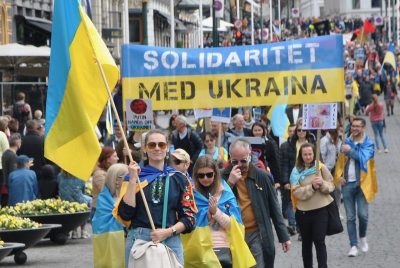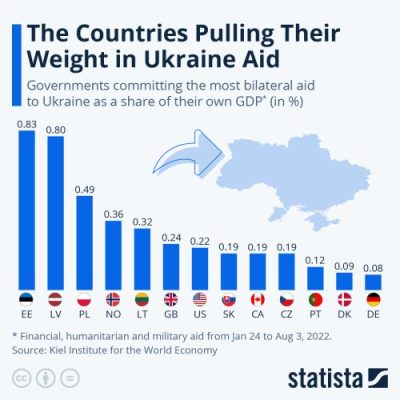Norwegians were eager to demonstrate their support for Ukraine last spring, but now find themselves under pressure to boost generosity and express more solidarity with both Ukraine and the rest of Europe. The government wasn’t answering all the calls as Ukrainians marked their homeland’s Independence Day and six months of the war launched by Russia.

“Our national day should be a day of joy,” Natalia Ravn-Christensen of the Ukrainian Association in Norway told newspaper Dagsavisen just before new demonstrations were planned on Wednesday. “Now we don’t have so much to be joyful about, but we still have a lot to celebrate. The whole world thought we’d have to give up after just a few days (of Russian attacks on towns and cities around the country) but that hasn’t happened.”
Ravn-Christensen claims that 90 percent of all Ukrainians still think Ukraine will win the war launched on February 24 by Russian President Vladimir Putin. She thinks this year’s national day marking independence from the former Soviet Union is more important than ever, but worries that a certain degree of war fatigue is setting in, half-a-year after Putin’s invasion shocked the entire European continent and Norway as well.
Demonstrations against Putin’s war are still held daily, but the numbers of participants have declined markedly. The war hasn’t been dominating the news lately either. Several military experts have also come to believe the war will be a lengthy one with no diplomatic solution in sight, while many Norwegians have seemed more preoccupied with having some fun during this first post-Corona summer, or by how the war has sent energy prices up, especially electricity rates.
Kristin Skare Orgeret, a professor and media researcher at the Oslo Metropolitan University, notes how the public often loses interest even in major issues, and the barrage of media coverage right after Russia’s invasion on February 24 has declined markedly. The actual war in Ukraine, and what it means for democracy, has now fallen under the shadow of all the news about the high fuel, electricity and food prices that the war has sparked.
“When the media write fewer stories, it affects the public,” Orgeret told newspaper Aftenposten. “That in turn affects politicians.” She stressed, though, that it’s “very important not to forget this war. We can’t go into a phase like Ukraine was in before the war, after the occupations of Crimea and Donbas.” Karen Helene Ulltveit-Moe, a professor at the University of Oslo, claimed in newspaper Dagens Næringsliv (DN) recently that “we Norwegians are first and foremost thinking about ourselves and less about our European neighbours.”
Norway, meanwhile, continues to profit greatly on the high prices for its gas exports, prompting calls that Norwegian exporters should lower their gas prices to Europe or at least stash a solid chunk of the profits in some kind of “solidarity fund” aimed at helping both Ukraine and Europe. Details of how such a fund could operate are vague, however, as is the Norwegian government’s response. A state secretary in Norway’s Oil & Energy Ministry rejected calls for any price caps on gas, claiming on NRK’s national radio program Politisk kvarter Wednesday morning that the “most important thing” Norway can do right now is to simply be a “steady and reliable” producer and supplier of gas and “a secure partner for Europe.”
Concerns are rising, though, about how Norwegians’ initial outpouring of sympathy and support for Ukraine has been replaced by concern over pocketbook issues at home like the higher prices for fuel, food and especially electricity. Even though most Norwegians can afford the price hikes, politicians seeking voter support are spending far more energy of their own now on responding to the calls for more state compensation not only for households but also now for businesses.
That in turn has led to the accusations that Norwegians are showing themselves to be spoiled or even greedy, worrying more about the monthly electricity bills for their large homes and holiday properties than they are about the threat Russia has posed to democracy in Europe. Some top officials including both NATO Secretary General Jens Stoltenberg and Prime Minister Jonas Gahr Støre have tried to remind Europeans and Norwegians that while they’re having to pay higher prices for everyday goods and services, Ukrainians are paying with their lives.
“There’s a war in Europe and we must contribute where we can,” editorialized Dagsavisen as well this week. Norwegians are being regularly urged not to fall into any trap set by a Russian leader who wants to divide and conquer western alliances.

Norway has also scored fairly high in a recent survey of how countries rank in direct financial support to Ukraine (see graph) and on Wednesday came government announcements of more military aid to help Ukraine defend itself against Russian attacks. Norway and the UK are teaming up once again to send new drones to Ukrainian troops and train them for use in surveillance efforts. Instead of sending Ukrainian soldiers into dangerous areas to assess Russian troop movements, the drones can be used instead.
Ravn-Christensen of the local Ukrainian organization in Norway has been among those calling for such military support, especially for more heavy weapons. “That’s the most important,” she told Dagsavisen. “It doesn’t help to just talk, politicians in Norway need to take more action, and sacrifice more.” She claims Norway “can afford to deliver more weapons, and has the opportunity to do so. Politicians must stand up for their values, help the weak and support democracy.”
It’s also important for Ravn-Christensen and other Ukrainians to not be forgotten. She admits herself that “people unfortunately get used to the fact there’s a war going on.” She’s certain that Ukraine’s Independence Day will be more meaningful than ever this year.
“Now we know how important independence is,” she told Dagsavisen, “and that we must fight for it.”
NewsinEnglish.no/Nina Berglund

